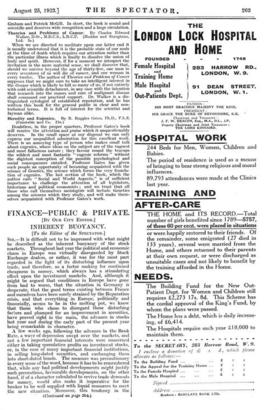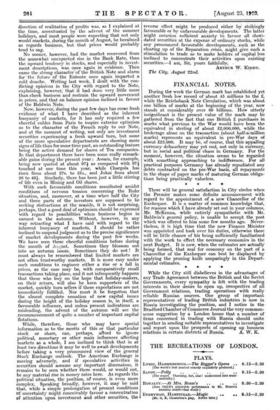FINANCE—PUBLIC & PRIVATE. [BY OLTR CITY EDITOR.] INHERENT BUOYANCY. [To
the Editor of the SPECTATOR.] Sin,—It is difficult not to be impressed with what might be described as the inherent buoyancy of the stock markets. Throughout last year the political and economic chaos in Europe was virtually disregarded by Stock Exchange dealers, or rather, it was for the most part regarded in the light of its disturbing influence upon trade, and therefore, as a factor making for continued cheapness in money, which always has a stimulating effect upon the investment markets. And, although it might be argued that conditions in Europe have gone from. bad to worse, that the situation in Germany is desperate, that the good terms existing between France and ourselves have been sorely strained by the Reparation crisis, and that everything in Europe, politically and financially, seems to be in the melting pot, we know that those who chose to disregard these disturbing factors and plumped for an improvement in securities, have proved right in the main, the advance in stocks last year and during the early part of the present year being remarkable in character.
A few weeks ago, following the advance in the Bank Rate, a wave of depression swept over the markets, and not a few important financial interests were concerned either in taking speculative profits on investment stocks, or, in the case of many important financial institutions, in selling long-dated securities, and exchanging them into short-dated bonds. The measure was precautionary in every sense of the word, because it has to be remembered that, while any bad political developments might justify such precautions, favourable developments, on the other hand, if of a character calculated to revive trade demands for money, would also make it imperative for the banker to be well supplied with liquid resources to meet ,the new. situation. Moreover, this tendency in the - (Continued on page 2(14.) direction of realization of profits was, as I explained at the time, accentuated by the advent of the summer holidays, and most people were expecting that not only would :markets, _during the month of August, be becalmed as regards business, but that prices would probably tend to sag. No sooner, however, had the market recovered from the somewhat unexpected rise in the Bank Rate,. than the upward tendency in stocks, and especially in _invest- ment descriptions, was once again in evidence. Then came the strong cha:rader-of the British Note and alarm for - the future of -the Entente once again imparted a cold douche. Writing last week, I dealt with the con- flicting opinions in the City with regard to the Note, explaining, however; that it had done very little more than check business and restrain the upward movement in prices, and that on balance opinion inclined in favour of the Baldwin Note. - Now, however, during the past few days has come fresh evidence of what I have described as the inherent buoyancy of markets, for it has only required a few cheerful cables from Paris to inspire extreme optimism as to the character of the French reply to our Note, and at the moment of writing, not only are investment securities experiencing a fresh upward turn, but some of the more speculative departments are showing more signs of life than for some time past, an outstanding feature being the active demand for shares of Tea companies. In that department there have been some really remark- able gains during the present year : Assam, for example, being now quoted at about 971 as compared with 671 touched at one time this year, while Chargola has risen from about 27s. to 51s., and Jokai from about 26 to 44. Similarly, there has been just a little stirring of life even in Mining and Oil shares. With such favourable conditions manifested amidst conditions of nervous tension concerning the Ruhr situation, and, moreover, at a time when half the City and three parts of the investors are supposed to be seeking distractions at the seaside, it is not surprising, perhaps, that a good deal of optimism should be expressed with regard to possibilities when business begins in earnest in the autumn. Without, however, in any way retracting what I have said with regard to the inherent buoyancy of markets, I should be rather inclined to suspend judgment as to the precise significance of market developments during the past few weeks. We have seen these cheerful conditions before during the month of August. Sometimes they blossom out into an autumn boom. Sometimes they do not ! It must always be remembered that limited markets are not often trustworthy markets. It is more easy under such conditions to engineer either a rise or a fall in prices, as the case may be, with comparatively small transactions taking place, and it not infrequently happens that those who buy on the hope that holiday-makers, on their return, will also be keen supporters of the market, quickly turn sellers if these expectations are not immediately -ftiffilled. Nor must it be forgotten that the almost complete cessation of new capital issues during the height of the holiday season is, in itself, a favourable influence, and unless present indications are misleading, the advent of the autumn will see the _recommencement of quite a number of important capital flotations.
While, therefore, those who may have special information as to the merits of this or that particular stock or share, can, perhaps, afford to ignore political, monetary or other main influences affecting markets as a whole, I am inclined to think that in at least two directions it may be well to await developments before taking a very pronounced view of the general Stock Exchange outlook. The American Exchange is moving adversely, and if speculative activities in securities should assume any important dimensions, it remains to be seen whether there would, or would not, be any material rise in money rates here. As regards the political situation, the position, Of course, is even more complex. Speaking broadly, however, it may be said that, while a simple prolongation of present conditions -of. uncertainty might conceivably favour a concentration of attention upon investment and other securities, the reverse effect might be produced either by strikingly favourable or by unfavourable developments. The latter might occasion sufficient anxiety to favour all short- dated securities atthe expetis6 of' ordinary stocks, while any pronounced _ favourable . developments,, such as the clearing up of the Reparation crisis, might give such a stimulation to trade as to make holders of capital less inclined to concentrate their activities upon existing securities.—I am, Sir, yours faithfully, .
The City, August 22nd.
ARTHUR W. KIDDY.



































 Previous page
Previous page